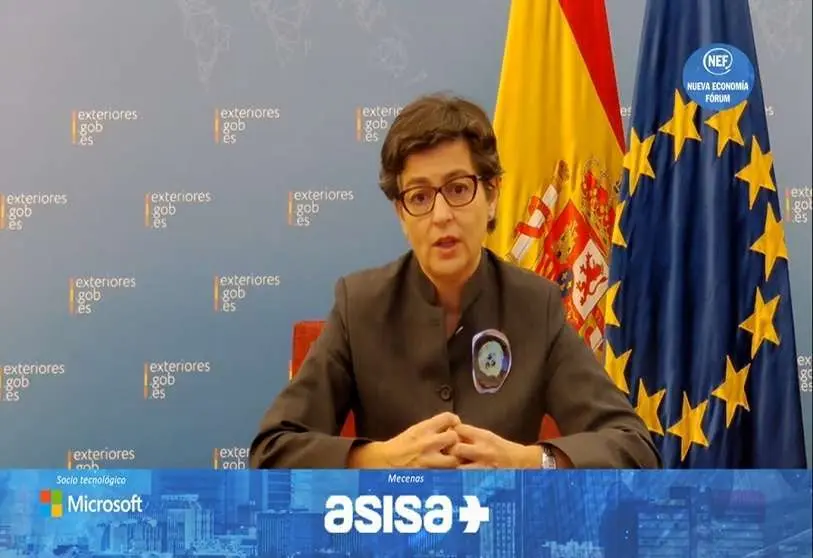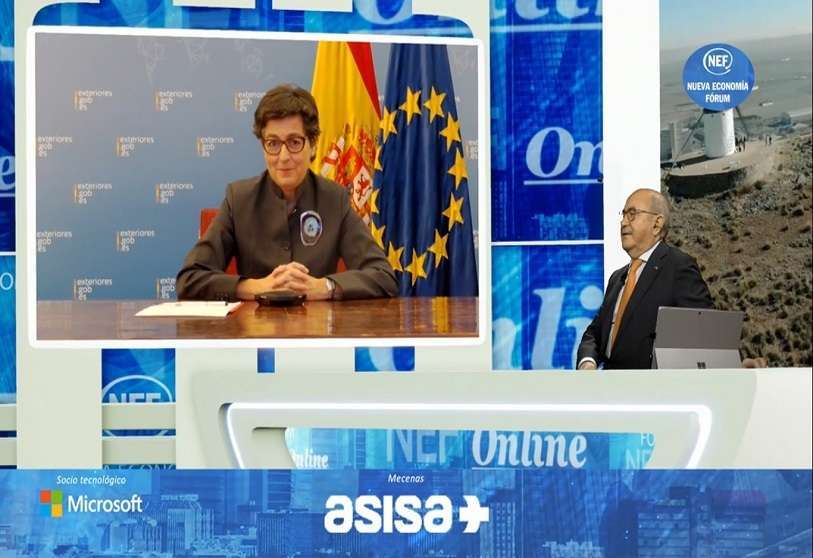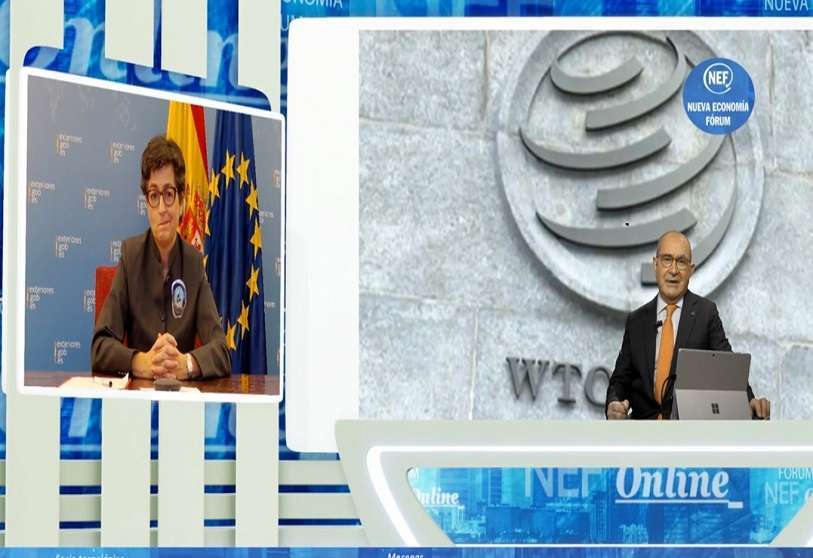The Minister of Foreign Affairs, Arancha González Laya, speaks at the Nueva Economía Forum

The Minister of Foreign Affairs, European Union and Cooperation took part in an event organised by Nueva Economía Fórum, with the participation of its President, José Luis Rodríguez, in which she explained the new Foreign Action Strategy.
González Laya first of all wanted to highlight Spain's vocation as a global actor and not just a regional one, as well as the importance of globalisation having a Spanish identity.
With regard to the new External Action Strategy, he assured that four values and principles will underpin it. Firstly, Europeanism appears as a key element, as Spain's external action is understood as an extension of the country's participation in the European Union. Furthermore, the minister stressed the need for greater European integration and autonomy, which will lead to more European actions abroad.
Secondly, the new Strategy will emphasise multilateralism, which, in the minister's words, is a guarantee of insertion in the world for a medium-sized power such as Spain, especially in order to be on an equal footing with the great powers.
Thirdly, the deepening of our main diplomatic ties, that is, those with Latin America, the southern neighbourhood, and transatlantic relations. And finally, solidarity, understood not only as a value of society but also with the understanding that the better off our neighbouring countries are, the better off Spain will be.

Asked about the new stage that is opening up in the transatlantic relationship between the United States and the European Union, the minister said that "a period of hope is opening up" after the rupture that occurred during the years of the Trump Administration. She has already stressed the need to "give the transatlantic relationship a soul", pointing out that in the past the compass of this relationship was the fight against totalitarianism, then the promotion of democracy, then globalisation, and that today it must be to re-humanise this globalisation.
As for Spain's diplomatic mission in Washington, it will remain unchanged, and therefore the ambassador will continue his work until the end of his mandate, when it is due to expire, in accordance with the established deadlines, the minister confirmed.
González Laya also referred to the future of NATO and Spain's position in the organisation. In this respect, she explained that the Atlantic Alliance has embarked on a process of reflection on its strategic position for the coming years, in a world in which "the challenges are more diffuse, the actors are more diverse and the technological dimension is increasingly important in the field of security and defence". "The most important part of the discussion with Biden will be the strategic direction," she remarked.
The minister also highlighted Spain's support for the organisation and the country's commitment to meeting the minimum investment requirements, as well as the efforts made in missions such as Afghanistan.
The minister also took advantage of the event to deny that the United States is planning to move the Rota base to Morocco, as had been speculated for weeks.
With regard to the relationship between Spain and Morocco, she said that "they enjoy health and complicity because they are broad and deep relations". Despite the points of disagreement, he wanted to "highlight the strength of the relationship" in different areas. As for the high-level meeting that was cancelled, he said that there is still no date scheduled, but that it will be held, and with regard to the question of the Sahara, he defended a "lasting solution" within the framework of the United Nations.

With regard to Latin America, González Laya emphasised the promotion of greater cooperation with Europe, through trade agreements such as that between the EU and Mercosur.
Asked about Venezuela and Juan Guaidó, she recalled that Spain does not recognise the result of the last elections to the National Assembly, in which the Chavista alliance led by the PSUV (United Socialist Party of Venezuela) was victorious. Reiterating that the Spanish government will follow the common position adopted by the 27 EU member states, based on three pillars: humanitarian response to the migration of thousands of Venezuelans to neighbouring countries; support for the democratic opposition, seeking greater complicity and unity both among themselves and with society; and the promotion of a political solution.
Regarding the position adopted by the new US Secretary of State, Antony Blinken, who at the Senate confirmation hearing assured that they would continue to recognise Guaidó as president in charge, unlike the EU, which only recognises him as a "privileged interlocutor" of the opposition, González Laya said that Brussels and Washington will cooperate to promote change in the Caribbean country.
The new External Action Strategy also considers the importance of maintaining good relations with Beijing, with which the European Union recently signed a major investment agreement that will facilitate the entry of European companies into the Asian giant.
Maintaining good relations is, in the minister's opinion, important for resolving issues such as the decarbonisation of the planet, which will be addressed at the next climate summit in Glasgow, and in which reaching an agreement with China is essential if results are to be achieved.
He also spoke of establishing a more strategic approach to the relationship with Beijing and ensuring fair play and fair competition in investment and technology.
The COVID-19 pandemic was one of the most relevant topics discussed at the event, especially as we are in the midst of the third wave and the vaccination campaign.
The new External Action Strategy presented by the ministry includes two main approaches to the strategy to be followed with regard to the impact of the pandemic. Firstly, the need for a new social contract based on competitive economies, open markets, access to investment and job creation, but which attacks the root causes of inequality. The minister pointed out that progress should not only be measured in terms of economic growth, but also in terms of how "it affects citizens".
On the other hand, the Minister of Foreign Affairs referred to the vulnerability in certain sectors that the European Union has shown during the pandemic due to its dependence on limited sources of supply. In her opinion, this is an issue that the EU's partners should address, not necessarily by producing everything necessary, but by guaranteeing strategic stocks of inputs that will help "to be more resilient in future crises" and guarantee "strategic autonomy".

"This strategy for external action dedicates a large part of it to economic diplomacy", the minister said in response to a question from the president of the CEOE, Antonio Garamendi. The ministry's new strategy will seek to cooperate with the autonomous communities and large companies, but also with SMEs, seeking their internationalisation.
Working with partners who want clear rules so that trade remains open but with "fair play" is another of the ministry's priorities, and this is what the minister assured that they will defend in multilateral organisations such as the World Trade Organisation (WTO) and the OECD.
With regard to Spain's contribution to international cooperation and the defence of human rights, the minister stressed that our country is a point of reference on issues such as the defence of the rights of the LGBT population, women and dependent persons, and gave as a specific example of foreign action in this regard the resolution promoted by Spain in the United Nations General Assembly to ensure that women and girls are not left behind in the recovery from the pandemic. "The protection of human rights is a hallmark of our external identity," he said.
In the defence of human rights, the EU will opt for punitive action in the case of serious violations, thanks to the new sanctions regime approved by the EU, and also for preventive action through transparency.
International cooperation will be another of the main priorities through the modernisation of the cooperation law and associated instruments, as well as the AECID, adapting all of this to the framework established in the 2030 agenda. Another of the ministry's tasks will be to involve civil society and NGOs in order to "build a more coherent and coordinated ecosystem".








